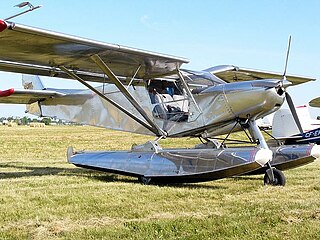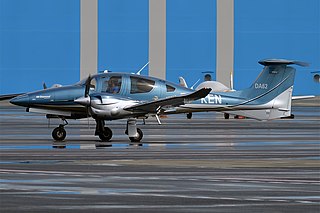Related Research Articles

The Zenith STOL CH 701 and CH 750 are a family of light, two-place kit-built STOL aircraft designed by Canadian aeronautical engineer Chris Heintz through his Midland, Ontario, based company, Zenair. The CH 701 first flew in 1986 and the design is still in production. The CH 750 was first introduced in 2008. The CH 701 was later developed into the four-place Zenith STOL CH 801.

An electric aircraft is an aircraft powered by electricity. Electric aircraft are seen as a way to reduce the environmental effects of aviation, providing zero emissions and quieter flights. Electricity may be supplied by a variety of methods, the most common being batteries. Most have electric motors driving propellers or turbines.
Pipistrel d.o.o Ajdovščina is a Slovenian light aircraft manufacturer established in 1989 by Ivo Boscarol and based in Ajdovščina. Its facilities are located in Ajdovščina, Slovenia, and near Gorizia, Italy. By March 2019, Pipistrel had produced more than 2000 aircraft.

The Pipistrel Virus is a two-seat, single engine light aircraft manufactured by Pipistrel in Slovenia and Italy and sold as an ultralight, homebuilt kit, or light-sport aircraft.

The Pipistrel Sinus is a two-seat, single-engine ultralight motor glider, developed and manufactured by Pipistrel in Slovenia and Italy. Its design has served as the base for future Pipistrel developments such as the Virus and Alpha Trainer.

The Flightstar is a large family of single and two-seat, high wing, single engined kit aircraft that was produced by Flightstar Sportplanes of South Woodstock, Connecticut. In 2009 the rights, tooling and parts inventory were sold to Yuneec International of China when Flightstar Sportplanes' business was wound up.

The Pipistrel Taurus is a Slovenian self-launched two-seat microlight glider designed and built by Pipistrel.

The e-Genius is a crewed electric airplane developed by the Institute of Aircraft Design at the University of Stuttgart, which first flew in May 2011.

The Pipistrel Panthera is a lightweight, all-composite, highly efficient four-seat aircraft under development by Pipistrel of Slovenia.

The Pipistrel Alpha Trainer is a Slovenian two-seat, single-engine light-sport aircraft intended specifically for flight training, designed and produced by Pipistrel in Gorizia, Italy.

The Diamond DA62 is a five- to seven-seat, twin-engine light aircraft produced by Diamond Aircraft Industries and first announced in March 2012.

The Airbus E-Fan is a prototype two-seater electric aircraft that was under development by Airbus. It was flown in front of the world press at the Farnborough Airshow in the United Kingdom in July 2014. The target market was intended to be pilot training, but production of the aircraft was cancelled in April 2017.

The ScaleWings SW51 Mustang, formerly marketed as the FK-Lightplanes FK51 Mustang, is an Austrian ultralight, light-sport aircraft and homebuilt aircraft that was designed by ScaleWings of Strasswalchen, Austria and was initially produced by FK-Lightplanes of Krosno, Poland, who introduced it publicly at the AERO Friedrichshafen show in 2013. After FK-Lightplanes ceased production, the design was built by ScaleWings.
The Liaoning Ruixiang RX1E is a Chinese two-seat electric aircraft, designed by the Liaoning General Aviation Academy at Shenyang Aerospace University and manufactured by the Liaoning Ruixiang General Aviation Manufacture Company Limited of Shenyang.

The Bye Aerospace eFlyer 2 is a light electric aircraft designed and under development by Bye Aerospace of Denver, Colorado.

The NASA X-57 Maxwell was an experimental aircraft being developed by NASA, intended to demonstrate technology to reduce fuel use, emissions, and noise. The first flight of the X-57 was scheduled to take place in 2023, but the program was cancelled due to problems with the propulsion system.

The Volocopter 2X is a German two-seat, optionally-piloted, multirotor eVTOL aircraft. The personal air vehicle was designed and produced by Volocopter GmbH of Bruchsal, and first introduced at the AERO Friedrichshafen airshow in 2017. The aircraft is sold complete and ready-to-fly. Volocopter was formerly known as E-volo.

The Pivotal BlackFly is an American electric-powered VTOL personal air vehicle designed by Canadian engineer Marcus Leng. It was publicly revealed in 2018, after nine years of development. The aircraft is intended to be supplied complete and ready-to-fly and Opener are in the process of starting production at their Palo Alto, California site.

The Pipistrel Velis Electro is a Slovenian light aircraft, designed and produced by Pipistrel of Ajdovščina. The aircraft was EASA CS-LSA fully electric type certified in June 2020 and it is intended primarily for the training aircraft role, particularly multiple successive take-off and landings at the airfield. The design is the first type certified electric aircraft and is supplied complete and ready-to-fly.
The Pipistrel Nuuva V300 is an unmanned hybrid-electric VTOL cargo aircraft currently under development by Pipistrel and projected to be released in 2023. The aircraft has eight electric motors driving propellers providing lift as well as a single internal combustion engine driving a propeller providing thrust. The company claims that the aircraft will be able to operate with a typical cargo weight of 300 kg (661 lb) and a typical range of 300 km (162 nmi). In October 2020 the company announced that the aircraft would implement a Honeywell fly-by-wire system.
References
- ↑ "WATTsUP, the new 2-seat electric trainer took its maiden flight - 12. 8. 2014". Pipistrel. Archived from the original on 1 May 2018. Retrieved August 29, 2014.
- 1 2 3 4 5 6 Niles, Russ (24 August 2014). "Pipistrel Flies WATTsUP Electric Trainer". AVweb. Retrieved 29 August 2014.
- 1 2 3 Tacke, Willi; Marino Boric; et al: World Directory of Light Aviation 2015-16, page 73. Flying Pages Europe SARL, 2015. ISSN 1368-485X
- ↑ Grady, Mary (14 April 2015). "Pipistrel Alpha Electro Aero 2015". AVweb. Retrieved 20 April 2015.
- ↑ Horne, Thomas (27 August 2014). "Pipistrel introduces electric trainer". AOPA. Retrieved August 29, 2014.
- ↑ Bergqvist, Pia (26 August 2014). "New Electric Trainer from Pipistrel Takes Flight". FLYING. Retrieved August 29, 2014.
- ↑ "Pipistrel Aircraft WATTsUP - Pipistrel". pipistrel.si. Archived from the original on 10 May 2015. Retrieved 13 March 2015.